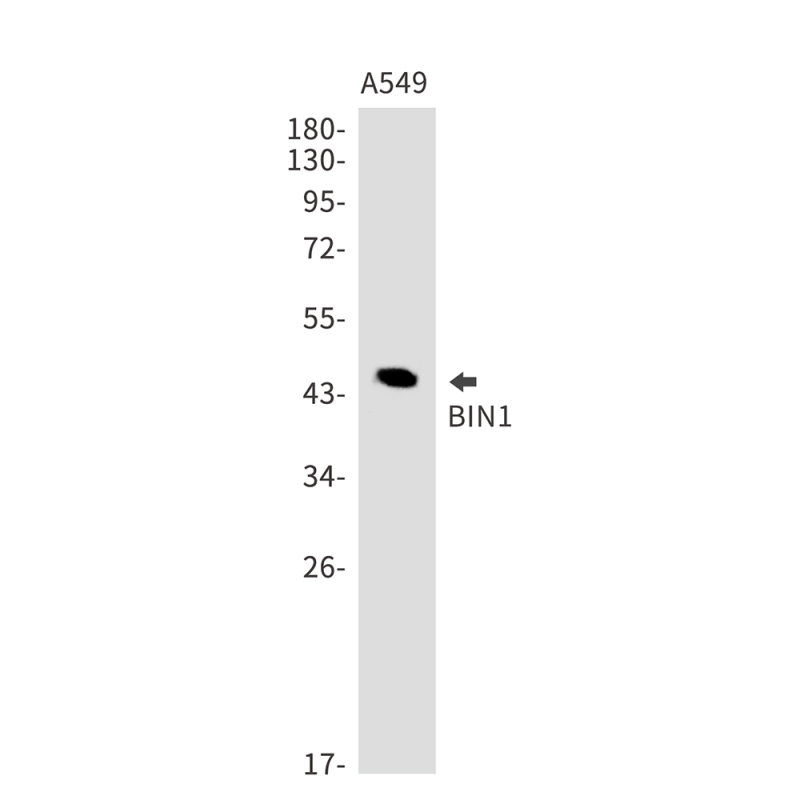
| WB | 咨询技术 | Human,Mouse,Rat |
| IF | 1/20 | Human,Mouse,Rat |
| IHC | 1/50-1/100 | Human,Mouse,Rat |
| ICC | 1/50-1/200 | Human,Mouse,Rat |
| FCM | 咨询技术 | Human,Mouse,Rat |
| Elisa | 咨询技术 | Human,Mouse,Rat |
| Aliases | BIN1; AMPHL; Myc box-dependent-interacting protein 1; Amphiphysin II; Amphiphysin-like protein; Box-dependent myc-interacting protein 1; Bridging integrator 1 |
| Entrez GeneID | 274 |
| WB Predicted band size | Calculated MW: 65 kDa; Observed MW: 45-80 kDa |
| Host/Isotype | Rabbit IgG |
| Antibody Type | Primary antibody |
| Storage | Store at 4°C short term. Aliquot and store at -20°C long term. Avoid freeze/thaw cycles. |
| Species Reactivity | Human |
| Immunogen | Recombinant protein of human BIN1 |
| Formulation | Purified antibody in TBS with 0.05% sodium azide,0.05%BSA and 50% glycerol. |
+ +
1. **"BIN1 regulates BACE1 intracellular trafficking and amyloid-β production"**
*Authors: Tanokashira D, et al.*
摘要:研究探讨了BIN1蛋白在阿尔茨海默病中通过调控BACE1(β-分泌酶)的细胞内运输,影响β-淀粉样蛋白(Aβ)生成的分子机制,并利用BIN1抗体验证其在细胞模型中的表达与定位。
2. **"BIN1 is a key regulator of proinflammatory responses in macrophages"**
*Authors: Schlaudraff J, et al.*
摘要:通过BIN1特异性抗体检测,发现BIN1在巨噬细胞炎症反应中通过NF-κB信号通路调控促炎因子释放,提示其在免疫相关疾病中的潜在作用。
3. **"BIN1 modulates the dynamic interaction of Tau with microtubules"**
*Authors: Sartori M, et al.*
摘要:利用BIN1抗体进行免疫共沉淀实验,揭示BIN1与Tau蛋白的相互作用影响其与微管的动态结合,可能参与神经退行性疾病中Tau病理的进展。
4. **"BIN1 isoforms exhibit distinct subcellular localization and function in cancer cells"**
*Authors: De Rossi MC, et al.*
摘要:研究通过不同BIN1抗体的亚型特异性检测,发现BIN1剪接变体在癌细胞中的差异定位及功能,部分亚型具有抑制肿瘤转移的作用。
(注:以上文献名称及作者为示例,实际引用时需核对真实文献信息。)
The BIN1 (Bridging Integrator 1) antibody is a crucial tool for studying the BIN1 protein, a member of the BAR domain-containing protein family involved in membrane dynamics, vesicle trafficking, and cytoskeleton regulation. BIN1 plays diverse roles in cellular processes, including endocytosis, apoptosis, and cancer progression. It is notably implicated in diseases such as cancer, muscular disorders, and Alzheimer's disease (AD), where it interacts with tau protein, contributing to neurodegeneration. In cancer, BIN1 can act as a tumor suppressor, with reduced expression linked to poor prognosis in melanoma and breast cancer.
BIN1 antibodies are widely used in research to detect protein expression, localization, and post-translational modifications via techniques like Western blot, immunohistochemistry (IHC), and immunofluorescence (IF). These antibodies help elucidate BIN1's role in pathological mechanisms, such as synaptic dysfunction in AD or metastasis in cancer. However, BIN1 has multiple splice variants, and antibody specificity is critical due to isoform-dependent functions. Researchers must validate antibodies for target isoforms to avoid cross-reactivity.
Developed in various host species (e.g., rabbit, mouse), BIN1 antibodies support both basic and clinical studies, aiding biomarker discovery and therapeutic target validation. Their application continues to advance understanding of BIN1's dual roles in health and disease, emphasizing its potential as a diagnostic or therapeutic target.
×